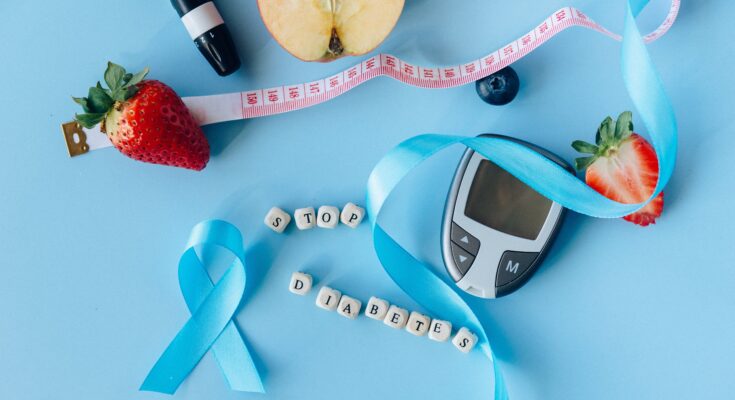Introduction
Navigating dietary choices can be challenging for individuals managing diabetes. In this guide, we unravel the complexities surrounding diet guidelines for diabetic patients, providing a roadmap to enhance health and well-being.
Diet Guidelines for Diabetic Patients
Maintaining a balanced diet is foundational for managing diabetes effectively. Embracing diet guidelines for diabetic patients ensures stable blood sugar levels and supports overall health. Let’s delve into key aspects:

Understanding the Basics
Dietary Choices: Crafting a diabetes-friendly menu involves selecting nutrient-dense foods. Focus on whole grains, lean proteins, and a variety of colorful vegetables. Strive for a well-rounded plate that encompasses all essential food groups.
Meal Timing: Distribute meals evenly throughout the day to prevent spikes in blood sugar. Consistent timing promotes better glucose control and supports the body’s natural insulin production.
Crafting a Diabetes-Friendly Plate
The Power of Portion Control
Balanced Portions: Optimal portion sizes prevent overeating and contribute to weight management. Be mindful of serving sizes, and use smaller plates to create a visual illusion of a fuller plate.
Strategic Snacking: Incorporate healthy snacks between meals to maintain steady energy levels. Nuts, seeds, and Greek yogurt make excellent choices.
Navigating Dietary Challenges
Dining Out with Diabetes
Menu Decoding: When dining out, scan menus for healthier options. Choose grilled over fried, and opt for dishes rich in fiber. Don’t hesitate to customize your order to align with your dietary needs.
Smart Beverage Choices: Stay hydrated with water, and limit sugary beverages. Unsweetened herbal teas or infused water add variety without compromising on health.
FAQ’s – Answering Your Queries

Q: Can I Include Desserts in My Diet?
Absolutely! Opt for sugar-free or fruit-based desserts in moderation. Considerations like portion size and overall carbohydrate intake are key.
Q: Are Carbohydrates Off-Limits?
No, but choose complex carbohydrates like whole grains and legumes. These release glucose slowly, aiding in better blood sugar control.
Q: How Can I Manage Cravings?
Healthy snacks, such as sliced veggies with hummus, can curb cravings. Planning indulgences in moderation is also acceptable.
Q: Is Alcohol Permitted?
Moderation is key. Opt for dry wines or spirits mixed with sugar-free options. Monitor blood sugar levels closely.
Q: Are Cheat Days Allowed?
Occasional indulgences are acceptable. Plan them strategically, and compensate by adjusting insulin or medication as needed.
- Q: Can Diabetic Patients Enjoy Fruits?
- A: Yes, fruits can be part of a diabetic-friendly diet. Opt for whole fruits in moderation, and focus on those with lower glycemic index values, such as berries and apples.
- Q: Are Artificial Sweeteners Safe for Diabetics?
- A: In moderation, artificial sweeteners can be a safe alternative for diabetics. However, it’s essential to consult with a healthcare professional to determine the most suitable options.
- Q: What Role Do Fiber-Rich Foods Play in a Diabetic Diet?
- A: Fiber-rich foods, such as whole grains, legumes, and vegetables, are beneficial for diabetics. They help regulate blood sugar levels and contribute to overall digestive health.
- Q: How Can Diabetics Manage Their Carb Intake?
- A: Monitoring and spacing out carbohydrate intake throughout the day is crucial. Choose complex carbohydrates and be mindful of portion sizes to maintain stable blood sugar levels.
- Q: Is the Mediterranean Diet Suitable for Diabetics?
- A: Yes, the Mediterranean diet, rich in fruits, vegetables, whole grains, and healthy fats, can be beneficial for diabetics. It emphasizes balanced nutrition and portion control.
- Q: Can Diabetics Include Dairy Products in Their Diet?
- A: Yes, diabetics can include low-fat dairy products as part of their diet. These provide essential nutrients like calcium and protein without significantly impacting blood sugar levels.
- Q: What Snacking Options Are Recommended for Diabetics?
- A: Healthy snack options for diabetics include nuts, seeds, Greek yogurt, and raw vegetables with hummus. These choices contribute to sustained energy levels and support overall health.
- Q: How Does Alcohol Consumption Affect Blood Sugar Levels?
- A: Moderate alcohol consumption may be acceptable for some diabetics. However, it’s crucial to monitor blood sugar levels closely and be aware of the potential impact on medication effectiveness.
- Q: Are There Specific Foods Diabetics Should Avoid Completely?
- A: While moderation is key, diabetics should limit the intake of processed foods, sugary beverages, and high-sugar desserts. These can lead to rapid spikes in blood sugar levels.
- Q: How Can Family and Friends Support Diabetics in Maintaining a Healthy Diet?
- A: Providing emotional support, encouraging healthy food choices in social settings, and participating in physical activities together can greatly assist diabetics in adhering to their dietary guidelines.
Q: Can Supplements Support Diabetes Management?
Consult your healthcare provider before taking supplements. Some may offer benefits, but individual needs vary.

Conclusion
In conclusion, embracing diet guidelines for diabetic patients goes beyond restrictions; it’s about empowering yourself to make informed choices. Navigate this journey with confidence, and remember that small, consistent changes lead to lasting health improvements.


Haitian Barbie, Miss K Cordai, Trinity Starr Only Fans Leaks Mega Download( https://picturesporno.com )